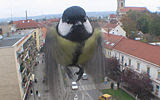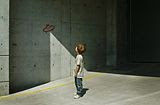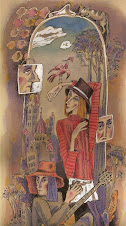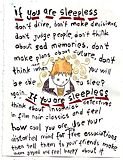Friday, March 18, 2011
Friday, March 11, 2011
Robert Genn on Art as "A Spiritual Event"
A spiritual event
March 11, 2011
Dear Sherrie,
I'm walking a labyrinth in Sedona, Arizona. I'm repeating the words, "My higher self is guiding me." As well as thinking of something else, I'm wondering if there's "something else."
Sedona is one of those spiritual hot spots where visitors come for all sorts of body work, yoga, self-improvement, or guru-inspired transformation. In the USA, this kind of stuff is a $10 billion-a-year industry. Sedona is also the place where three fine folks allowed themselves to be cooked to death in a spiritual sauna at the end of a labyrinth. This was at the urging of the now bankrupt and criminally implicated guru James Arthur Ray. If only those folks had been aware of the life-centering force and personal power one gets from the harmless little activity known as painting.
Yep, I'm talking about painting as a spiritual event. The act has something to do with making a physical tribute--a sort of a visual prayer--honouring the gifts that surround us and the life we've been given.
Before you hit that delete key or drop a note to say I've gone wonky again, here are a few observations for those who might be buying my oysters:
Art establishes and makes tangible a time, a place, a thought, an idea.
Art, properly made, enhances and enriches the lives of others.
Art gives an opportunity to endow new life and new meaning into the ordinary.
Art gives an opportunity to design your own world, and, as in your children, create a significant immortality.
Art is hard-earned work that is its own reward and has a degree of permanence.
Art, because it's so easy to do, and yet so difficult to do well, encourages humility in the human soul.
Art is an apprenticeship that can be stretched into a lifelong education.
Art thrives on democratic ideals, freedom of expression and rugged individualism.
Art permits you to step out of the labyrinth and into a quiet corner of your own private joy.
Best regards,
Robert
PS: "You don't need to follow someone else's path." (Nathan Thornburgh)
Esoterica: A spiritual awakening is often found and developed in a wilderness. It can be a poem or a parable of a deep forest, a mountain meadow or a cactus-studded desert. The outdoor spirit of plein air refreshes and further enables the indoor studio chapel. Each new creative beginning is a confirmation of the simple truth of taking care. And while it may all appear to be self-indulgent and isolating, every thought, every stroke, every caress of the brush adds a small refreshment of meaning and purpose to our universe. "Work is love made visible." (Kahlil Gibran)
March 11, 2011
Dear Sherrie,
I'm walking a labyrinth in Sedona, Arizona. I'm repeating the words, "My higher self is guiding me." As well as thinking of something else, I'm wondering if there's "something else."
Sedona is one of those spiritual hot spots where visitors come for all sorts of body work, yoga, self-improvement, or guru-inspired transformation. In the USA, this kind of stuff is a $10 billion-a-year industry. Sedona is also the place where three fine folks allowed themselves to be cooked to death in a spiritual sauna at the end of a labyrinth. This was at the urging of the now bankrupt and criminally implicated guru James Arthur Ray. If only those folks had been aware of the life-centering force and personal power one gets from the harmless little activity known as painting.
Yep, I'm talking about painting as a spiritual event. The act has something to do with making a physical tribute--a sort of a visual prayer--honouring the gifts that surround us and the life we've been given.
Before you hit that delete key or drop a note to say I've gone wonky again, here are a few observations for those who might be buying my oysters:
Art establishes and makes tangible a time, a place, a thought, an idea.
Art, properly made, enhances and enriches the lives of others.
Art gives an opportunity to endow new life and new meaning into the ordinary.
Art gives an opportunity to design your own world, and, as in your children, create a significant immortality.
Art is hard-earned work that is its own reward and has a degree of permanence.
Art, because it's so easy to do, and yet so difficult to do well, encourages humility in the human soul.
Art is an apprenticeship that can be stretched into a lifelong education.
Art thrives on democratic ideals, freedom of expression and rugged individualism.
Art permits you to step out of the labyrinth and into a quiet corner of your own private joy.
Best regards,
Robert
PS: "You don't need to follow someone else's path." (Nathan Thornburgh)
Esoterica: A spiritual awakening is often found and developed in a wilderness. It can be a poem or a parable of a deep forest, a mountain meadow or a cactus-studded desert. The outdoor spirit of plein air refreshes and further enables the indoor studio chapel. Each new creative beginning is a confirmation of the simple truth of taking care. And while it may all appear to be self-indulgent and isolating, every thought, every stroke, every caress of the brush adds a small refreshment of meaning and purpose to our universe. "Work is love made visible." (Kahlil Gibran)
Wednesday, March 9, 2011
Tuesday, March 1, 2011
Cary Tennis discusses Affirmations & Essential Practices
The foundation of the Amherst Writers and Artists workshop lies in five simple principles and five simple practices, quoted here as they appear in the book that acts as a guide for this workshop, Writing Alone and With Others, by Pat Schneider:
"The Five Essential Affirmations:
These affirmations rest on a definition of personhood that is nonhierarchical, and a definition of writing as an art form available to all persons.
1. Everyone has a strong, unique voice.
2. Everyone is born with creative genius.
3. Writing as an art form belongs to all people, regardless of economic class or educational level.
4. The teaching of craft can be done without damage to a writer's original voice or artistic self-esteem.
5. A writer is someone who writes.
The Five Essential Practices:
1. A nonhierarchical spirit (how we treat writing) in the workshop is maintained while at the same time an appropriate discipline (how we interact as a group) keeps writers safe.
2. Confidentiality about what is written in the workshop is maintained, and the privacy of the writer is protected. All writing is treated as fiction unless the writer requests that it be treated as autobiography. At all times writers are free to refrain from reading their work aloud.
3. Absolutely no criticism, suggestion, or question is directed toward the writer in response to first-draft, just-written work. A thorough critique is offered only when the writer asks for it and distributes work in manuscript form. Critique is balanced; there is as much affirmation as suggestion for change.
4. The teaching of craft is taken seriously and is conducted through exercises that invite experimentation and growth as well as through response to manuscripts and in private conferences.
5. The leader writes along with the participants and reads that work aloud at least once in each writing session. This practice is absolutely necessary, for only in this way is there equality of risk taking and mutuality of trust."
I have taken to reading these simple statements every session. It has a nice effect on the mind. It seems to remind the creative engine: OK, you can get to work now, there is a good structure here, it's time to open up and reveal your mysteries.
"The Five Essential Affirmations:
These affirmations rest on a definition of personhood that is nonhierarchical, and a definition of writing as an art form available to all persons.
1. Everyone has a strong, unique voice.
2. Everyone is born with creative genius.
3. Writing as an art form belongs to all people, regardless of economic class or educational level.
4. The teaching of craft can be done without damage to a writer's original voice or artistic self-esteem.
5. A writer is someone who writes.
The Five Essential Practices:
1. A nonhierarchical spirit (how we treat writing) in the workshop is maintained while at the same time an appropriate discipline (how we interact as a group) keeps writers safe.
2. Confidentiality about what is written in the workshop is maintained, and the privacy of the writer is protected. All writing is treated as fiction unless the writer requests that it be treated as autobiography. At all times writers are free to refrain from reading their work aloud.
3. Absolutely no criticism, suggestion, or question is directed toward the writer in response to first-draft, just-written work. A thorough critique is offered only when the writer asks for it and distributes work in manuscript form. Critique is balanced; there is as much affirmation as suggestion for change.
4. The teaching of craft is taken seriously and is conducted through exercises that invite experimentation and growth as well as through response to manuscripts and in private conferences.
5. The leader writes along with the participants and reads that work aloud at least once in each writing session. This practice is absolutely necessary, for only in this way is there equality of risk taking and mutuality of trust."
I have taken to reading these simple statements every session. It has a nice effect on the mind. It seems to remind the creative engine: OK, you can get to work now, there is a good structure here, it's time to open up and reveal your mysteries.
Cary Tennis answers "Am I still a writer if I don't feel like writing?"
Since you asked
Monday, Feb 26, 2007 07:04 ET
I don't feel like writing. Does that mean I'm not a writer?
Every time I start to work on my second novel, an enormous laziness descends upon me.
By Cary Tennis
*
Dear Cary,
I am a young, talented writer. (You should know how much effort it took me to write that sentence without any auto-excuses built in.)
It took me a lot of time and courage to figure out that I was writer in the first place, since I have been struggling with a low self-esteem for a long time. But here I am, 31, knowing what I want to do, where I want to go.
I got my first book published in 2002, a youth novel, and it was received well. I got married and became a father, and I have a full-time day job now to support my wonderful family. And he lived happily ever after? No.
Since my first book got out, surprise surprise, I haven't been writing anymore. Plenty of ideas, but I just didn't manage to commit myself to it. When I met the young author David Mitchell last year, it was so inspiring that I started again. But three chapters into my second novel, I bailed out, stopped.
It is not that I'm stuck in the story I want to write; it still has plenty of energy. But whenever I even think of writing, I feel this huge laziness coming up, like some old man with a heavily sighing voice says, "I just don't feel like it." It looks like I need outside stimuli to write; the power to start working again does not come from the inside. Strange.
Am I lazy? Am I afraid of failing? Do I lack the discipline, the artistic urge, the necessity? Am I not a writer after all? Should I give up writing and learn to be happy without it? These questions drive me crazy sometimes.
I feel like the man in Kafka's "The Trial" now, the one who waits all his life before the doors of the courtroom of his trial but never really gets in. I feel stuck, standing still like this. I know that I could be happy if I gave up writing, but I know that I would be missing something, too. Does that make sense?
If we have a talent, are we obliged to develop it? Or are we free to not use it at all?
G
Dear G,
You know, to me it seems possible that all the dire things you imagine could be true, and you could still write. You might very well be lazy, afraid of failure and undisciplined and still write. You might lack the urge and still write. You might not be a writer and still write. After all, a writer is just someone who writes. If you're writing, you're writing. It's a verb.
It is also true -- now that we are at the task of arranging apparent contradictions in ingenious ways -- that you are both obliged to develop your talent and free not to develop it. That is, you are free to acknowledge but defy obligations; you are free to say no to obligations.
I personally do believe that, as a guide to right living, we do have an obligation to develop our talents. But this is largely a practical rather than a moral matter for me. I do not think so highly of myself as to assume that the world will be greatly improved by my contributions. But I have observed that mastery of a craft is personally satisfying, and that failure and frustration are not. So I stick to writing and music, and do not paint or draw.
You are free. That is the thing. You are free not to write if you so choose. But you are not alone. Your choices matter to others. And the choices of others matter to you. I say this by way of getting at this notion that your inspiration should come only from some tiny, esoteric writing gland behind your navel. As a writer, you are dependent on others. You could not have published your first book alone. Why should you believe that you can write without any external stimulus? If you need to meet with a writers group, enroll in a class, arrange with a mentor or writing friend to share work on agreed-upon deadlines, or if you need to work out a schedule of deadlines with your editor or agent, then please do so. This is often the case. The idea that a writer works only from inner inspiration is, I think, a bit of a romantic myth, rooted in the idea of writer as solitary and mysterious hero. The writer may be that, but he is also a person in a web of community, and he is also fallible. He may be lazy and unable to meet deadlines; he may be, as I am, fearful of completion. So there is nothing wrong with building into your life some structures that compensate for your weaknesses. We are not supermen. We all need a little help.
As to this interesting voice you hear, this heavy sighing, I will say, as I believe I've said before, that only after I did a short course of cognitive therapy did I realize that the voice I was hearing, the one that said "I can't write!" and "My writing sucks!" had an actual historical source, and that the veracity of that statement could be objectively weighed against the evidence.
It may be true that you don't feel like writing. You are probably working hard and have many duties as a father. So there will be times that you have to write even though you don't feel like it. In that sense, writing is like your other roles in life as a worker and a father and a husband: It requires you to do things you don't want to do.
You do it because that is your role. It's the only way you can get anything done.
I hope this is of some help. Good luck with the next book.
Monday, Feb 26, 2007 07:04 ET
I don't feel like writing. Does that mean I'm not a writer?
Every time I start to work on my second novel, an enormous laziness descends upon me.
By Cary Tennis
*
Dear Cary,
I am a young, talented writer. (You should know how much effort it took me to write that sentence without any auto-excuses built in.)
It took me a lot of time and courage to figure out that I was writer in the first place, since I have been struggling with a low self-esteem for a long time. But here I am, 31, knowing what I want to do, where I want to go.
I got my first book published in 2002, a youth novel, and it was received well. I got married and became a father, and I have a full-time day job now to support my wonderful family. And he lived happily ever after? No.
Since my first book got out, surprise surprise, I haven't been writing anymore. Plenty of ideas, but I just didn't manage to commit myself to it. When I met the young author David Mitchell last year, it was so inspiring that I started again. But three chapters into my second novel, I bailed out, stopped.
It is not that I'm stuck in the story I want to write; it still has plenty of energy. But whenever I even think of writing, I feel this huge laziness coming up, like some old man with a heavily sighing voice says, "I just don't feel like it." It looks like I need outside stimuli to write; the power to start working again does not come from the inside. Strange.
Am I lazy? Am I afraid of failing? Do I lack the discipline, the artistic urge, the necessity? Am I not a writer after all? Should I give up writing and learn to be happy without it? These questions drive me crazy sometimes.
I feel like the man in Kafka's "The Trial" now, the one who waits all his life before the doors of the courtroom of his trial but never really gets in. I feel stuck, standing still like this. I know that I could be happy if I gave up writing, but I know that I would be missing something, too. Does that make sense?
If we have a talent, are we obliged to develop it? Or are we free to not use it at all?
G
Dear G,
You know, to me it seems possible that all the dire things you imagine could be true, and you could still write. You might very well be lazy, afraid of failure and undisciplined and still write. You might lack the urge and still write. You might not be a writer and still write. After all, a writer is just someone who writes. If you're writing, you're writing. It's a verb.
It is also true -- now that we are at the task of arranging apparent contradictions in ingenious ways -- that you are both obliged to develop your talent and free not to develop it. That is, you are free to acknowledge but defy obligations; you are free to say no to obligations.
I personally do believe that, as a guide to right living, we do have an obligation to develop our talents. But this is largely a practical rather than a moral matter for me. I do not think so highly of myself as to assume that the world will be greatly improved by my contributions. But I have observed that mastery of a craft is personally satisfying, and that failure and frustration are not. So I stick to writing and music, and do not paint or draw.
You are free. That is the thing. You are free not to write if you so choose. But you are not alone. Your choices matter to others. And the choices of others matter to you. I say this by way of getting at this notion that your inspiration should come only from some tiny, esoteric writing gland behind your navel. As a writer, you are dependent on others. You could not have published your first book alone. Why should you believe that you can write without any external stimulus? If you need to meet with a writers group, enroll in a class, arrange with a mentor or writing friend to share work on agreed-upon deadlines, or if you need to work out a schedule of deadlines with your editor or agent, then please do so. This is often the case. The idea that a writer works only from inner inspiration is, I think, a bit of a romantic myth, rooted in the idea of writer as solitary and mysterious hero. The writer may be that, but he is also a person in a web of community, and he is also fallible. He may be lazy and unable to meet deadlines; he may be, as I am, fearful of completion. So there is nothing wrong with building into your life some structures that compensate for your weaknesses. We are not supermen. We all need a little help.
As to this interesting voice you hear, this heavy sighing, I will say, as I believe I've said before, that only after I did a short course of cognitive therapy did I realize that the voice I was hearing, the one that said "I can't write!" and "My writing sucks!" had an actual historical source, and that the veracity of that statement could be objectively weighed against the evidence.
It may be true that you don't feel like writing. You are probably working hard and have many duties as a father. So there will be times that you have to write even though you don't feel like it. In that sense, writing is like your other roles in life as a worker and a father and a husband: It requires you to do things you don't want to do.
You do it because that is your role. It's the only way you can get anything done.
I hope this is of some help. Good luck with the next book.
Robert Genn on "The Sublime Gift"
The sublime gift
February 25, 2011
Dear Sherrie,
With my weakness for studying creative people, asking trick questions, and listening to dreams and rants, I've decided that some artists are blessed with a sublime gift. It's not of talent (that's another issue) but of attitude. Further, I don't think many, if any, are born with the attitude I'm talking about. I think some simply adopt it, often by trial and error.
To set the record straight, I've met lots of people who don't have the sublime gift at all and yet are highly realized and happy. You don't have to have the sublime gift to succeed, but it helps.
My sublimely gifted person shows a steady, workmanlike curiosity for the uncovering of his or her self-anointed processes. While the outward appearance may be a simple case of smug self-satisfaction, a closer look reveals simple task absorption tempered with the humility that comes with studenthood. Many, I was surprised to find, show an innate understanding of the methodology behind the practice of meditation.
Indeed, meditation is now being revalued as one of the great tools for clearing the mind for higher purposes and actions. Have you ever heard of "MBSR"? It means "Mindfulness Based Stress Reduction" and is currently enjoying a growing number of enthusiasts. According to recent research, this sort of meditation actually changes gray-matter density, setting it up for action in the "here and now" rather than in the historical past or the fantasized future. When worry dissipates, action begins. Lower stress means higher creativity. My sublimely gifted individual moves in a world of individualized, progressive exploration, divinely unimpressed by falling roof-beams.
And while my sublimely gifted whiz-bang may be capable of multi-tasking, he's also a "one thing at a time" kind of guy. Perhaps it's the sensitively laid-back meditative state, whether from Buddhist teachings or plucked from the rich storehouse of need that gives steadiness and accomplishment to an otherwise sky-falling life.
Task absorption and focus result in refreshed habits of perception. In my findings, limited and anecdotal though they may be, pretty well every winner in pretty well every field turns out to be what is known as a "good study." That quality, perhaps more than any other, brings on the sublimely gifted life.
Best regards,
Robert
PS: "Mindfulness meditation helps to reduce stress by providing insight. It's often our habits of perception and attitude rather than the circumstances themselves." (Lucinda Sykes, Toronto physician and MBSR course leader)
Esoterica: "Task saturation" is a term used in the airline industry. It's where a pilot (and often the co-pilot) suddenly have too many things going on and find it difficult to make wise decisions. Sadly, it's frequently mentioned as a cause in crashes. Pressure interferes with the ability to prioritize. Funnily, "too many things going on" is also a condition of the creative and inventive. It's a wise artist who learns to manage her own pressures.
February 25, 2011
Dear Sherrie,
With my weakness for studying creative people, asking trick questions, and listening to dreams and rants, I've decided that some artists are blessed with a sublime gift. It's not of talent (that's another issue) but of attitude. Further, I don't think many, if any, are born with the attitude I'm talking about. I think some simply adopt it, often by trial and error.
To set the record straight, I've met lots of people who don't have the sublime gift at all and yet are highly realized and happy. You don't have to have the sublime gift to succeed, but it helps.
My sublimely gifted person shows a steady, workmanlike curiosity for the uncovering of his or her self-anointed processes. While the outward appearance may be a simple case of smug self-satisfaction, a closer look reveals simple task absorption tempered with the humility that comes with studenthood. Many, I was surprised to find, show an innate understanding of the methodology behind the practice of meditation.
Indeed, meditation is now being revalued as one of the great tools for clearing the mind for higher purposes and actions. Have you ever heard of "MBSR"? It means "Mindfulness Based Stress Reduction" and is currently enjoying a growing number of enthusiasts. According to recent research, this sort of meditation actually changes gray-matter density, setting it up for action in the "here and now" rather than in the historical past or the fantasized future. When worry dissipates, action begins. Lower stress means higher creativity. My sublimely gifted individual moves in a world of individualized, progressive exploration, divinely unimpressed by falling roof-beams.
And while my sublimely gifted whiz-bang may be capable of multi-tasking, he's also a "one thing at a time" kind of guy. Perhaps it's the sensitively laid-back meditative state, whether from Buddhist teachings or plucked from the rich storehouse of need that gives steadiness and accomplishment to an otherwise sky-falling life.
Task absorption and focus result in refreshed habits of perception. In my findings, limited and anecdotal though they may be, pretty well every winner in pretty well every field turns out to be what is known as a "good study." That quality, perhaps more than any other, brings on the sublimely gifted life.
Best regards,
Robert
PS: "Mindfulness meditation helps to reduce stress by providing insight. It's often our habits of perception and attitude rather than the circumstances themselves." (Lucinda Sykes, Toronto physician and MBSR course leader)
Esoterica: "Task saturation" is a term used in the airline industry. It's where a pilot (and often the co-pilot) suddenly have too many things going on and find it difficult to make wise decisions. Sadly, it's frequently mentioned as a cause in crashes. Pressure interferes with the ability to prioritize. Funnily, "too many things going on" is also a condition of the creative and inventive. It's a wise artist who learns to manage her own pressures.
Subscribe to:
Posts (Atom)









